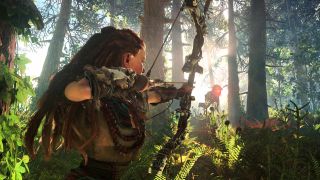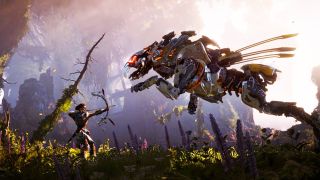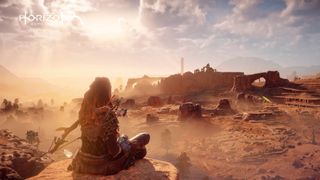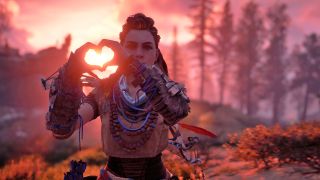Horizon Zero Dawn turns one year old today. While creator - Guerrilla Games - will undoubtedly be celebrating its own incredible technical achievement, the game’s healthy sales (7.6 million copies), and overwhelmingly positive feedback from critics and players, there will undoubtedly be a sense that something is missing from the Horizon’s impressive rap-sheet. Awards. Zero Dawn and its Frozen Wilds expansion have picked up a smattering of gongs for all manner of things (Aloy’s magnificent in-game performance won a Golden Joystick Award for Best Gaming Performance, where it also won Best PlayStation Game and Storytelling, and it scooped Outstanding Technical Achievement and storytelling at the DICE Awards) but have failed to score any major Game of the Year accolades despite being - in many people’s minds, mine included - easily the best games of the past 12 months. It’s impossible not to draw comparisons to the way sci-fi and superhero films are treated during movie awards season: hey, you’re not clever-clever enough, but have some minor awards for being popular.
“But Zelda!” I hear many of you cry, in unison, like I’ve somehow mortally insulted a close family member. Yes, Zelda: Breath of the Wild is a fine game, and it released a week after Horizon. It does plenty of smart things with the open-world genre that will undoubtedly cause many a developer to sit up, spit their coffee in amazement, and furiously start working out how to imitate. Zelda picked up almost all the major Game of the Year 2017 awards, and scooped GOTY in almost every major gaming outlet’s end-of-year lists, including GamesRadar’s own. Hyrule is a green and pleasant land to visit, and is filled with delightful quests and collectables that make you want to explore every inch. None of this is in doubt, and Zelda rightfully deserves to be in the top five titles of 2017. As a game, however, Zelda has something Horizon cannot possibly replicate, and that’s Nintendo’s unquestionable nostalgia. When March 2017 rolled around last year, people fell over themselves to play Zelda on Switch, often at the cost of investing time in Horizon, which didn’t appear on shiny new hardware or come pre-built with decades of pre-existing fandom.

For me, that concept is massively alien. I’ve never had any history with Nintendo, and don’t feel any particular loyalty to any gaming manufacturer. Sure, I’ve played and loved Wind Waker, but that’s all my previous experience with the series - meaning I’m seeing it with no expectation or baggage. And, finally, in case you’re thinking I have some kind of anti-Zelda agenda… I specifically bought a new Switch because I was so, so keen to play it. Yet I often feel underwhelmed or left cold by many of the features in the game, despite being determined to love them. As with many people, I actually discovered Horizon later, having ignored it at release because ‘it was a game about robot dinosaurs from the team that made the dull-as-hell Killzone’.
Apples (five ways) and oranges
When I look at Horizon and Zelda now (to be clear, I’ve played Zelda for 50+ hours, and Horizon for 100+ hours), there’s only one winner. Sure, comparing them is a moot point, and they run on very different consoles, but they’ve always competed in the same space for awards. Zelda’s soft, water-colour world is clever, sure, but it means nothing to me beyond the stuff I actually do in it. And the ability to get an apple out of a tree in five different ways can’t compete with the thrill of stalking a Thunderjaw or carefully picking off a campful of bandits. Ok, I’m being overly reductive here, but I’m highlighting what - for me - is the core difference between Zelda and Horizon.
Breath of the Wild is an exploration game with adventure elements, whereas Horizon is an adventure game with exploration elements. That may seem like a strange distinction to make, but it speaks to the reasons why so much about Horizon connects with me - and so many other people I’ve spoken to - and so little of Zelda impresses in the same way. Horizon has, for me, one of the most inventive and original open-worlds in gaming. The idea of a lush post-apocalypse populated with mechanical dinosaurs is creative enough, but they way the game justifies its world and everything in it via a thoughtful and chillingly believable narrative gives the whole thing complete authenticity. Stuff doesn’t just happen or exist because the developer put it there - it all feels like it belongs. When I’m in the game I feel like I belong there.

There’s a logic to everything in Horizon that remains unmatched by all but the likes of BioShock and Bethesda’s Elder Scrolls games. Exploring it doesn’t reveal the world’s secrets, because they’re woven into the fabric of the game - progressing the smart story and actually taking part in the adventure is what opens up Horizon’s true beauty, like one of the metal flowers you’re tasked with collecting. The more tasks you accept, the more items you collect, the more you allow Aloy to learn about herself, the more meaning is imparted to the rest of the world. It’s a hell of a feedback loop, and something that has kept me gripped through two playthroughs and a DLC expansion, each time - and even now, a year later - I’m learning more and more about the game itself.
Horizon is also the story of Aloy, and her progression from outcast to saviour of, well, the world. As an avatar for the player, everything revolves around her, and she adapts to her environment based on how you choose to play within the game’s parameters. It’s her adventure as played by you, and almost everything you do is either thrilling, compelling, or emotional. Taking down a Rockbreaker feels epic, surviving the assault after the Proving is a tense victory turned into a memorable calamity, and each piece of evidence you find relating to Elisabet Sobek’s work, and the end of humanity, paints a more vivid, darker, and ultimately more hopeful picture of why you exist in this fantastical world. Each part of the adventure combines to create something far greater than the sum of its parts; you feel like you’ve lived through Horizon in ways most other games can’t rival.
Lonely planet
By contrast, Zelda feels more about letting players discover and interpret Hyrule for themselves. It’s about exploring the land, which is the real ‘hero’ of the game. It’s handgliding off high peaks, beating tricky puzzles in a dungeon and feeling smart about yourself, and ultimately gathering the knowledge to beat the hardest challenges you can find. It’s freeform and rarely guided, impressing with the things you discover and not what you’re told about. Try something - see if it works. For me, though, the world isn’t compelling enough to keep me exploring, the scant story nowhere near as interesting. The devices in Zelda designed to make me investigate more of its world actually start to grate after a few hours - I don’t want weapons that break, or to cook my own food every time, or to stable my mount. It’s busy-work designed to immerse you in the game, but for me it lacks the pull of Horizon’s creative narrative and minute-to-minute thrills and challenges. Zelda quite rightly leans on its world and systems, Horizon on its narrative and action - herein lies the difference between exploration and adventure.

Combined with that nostalgia factor, it also marks the difference between Horizon and Zelda’s accolades. When a game offers cute mechanics designed to make players feel smart about themselves, it flatters. We like to talk about how wonderful Zelda’s world is, and that earlier quip about five different ways to get an apple from a tree is a perfect example of how the game makes us feel clever about something we did. We also love to heap praise on Nintendo, because that often justifies our fond memories as seasoned gamers, and satisfies the echo-chamber that routinely shouts about how much more creative the company is than other studios (which is, frankly, pretty insulting to all other gaming developers). Horizon, conversely, has a tougher time impressing because, although its thrills are bigger, its story more cleverly constructed, there’s little to make the player feel smart. Or like they’re playing something that pushes certain genre tropes forwards in any way. Horizon does things within the boundaries of what we already know, and offers a fresh, polished story within an existing framework. New and inventive is all well and good, but the ability to tell a great tale using existing techniques will trump fresh, yet not entirely thrilling, features any time. For me, Zelda expanded gaming horizons (pun intended), but not always in directions that excited me. Crudely put, for me, there’s nothing in Breath of the Wild’s world or exploration that comes close to expertly tracking a pair of Stalkers in Horizon, or felling a Behemoth with one last arrow as it charges directly at me. You feel different, perhaps, and that’s ok too - it’s a big world with enough room for everyone.
The net result of all this, combined with the fact they actually released within a week of each other in 2017, has meant that Horizon has been criminally ignored when it comes to accolades. A more traditional adventure on an established console is nowhere near as compelling a nominee as a game that purports to (and occasionally does) push its genre in new directions, on a hot piece of hardware with a pre-hyped fan-base. While it’s sad that Horizon hasn’t gotten the award respect it deserves, it’s by no means surprising, and ultimately I suspect Guerrilla will be contented with the success it has achieved in other areas. Zelda itself has slipped through the cracks before (Twilight Princess) and is enjoying its time in the sun. Me, though? I’d rather be in a snowstorm, at night, staring up at the northern lights from the icy wonderland that is The Cut, contemplating my next Frostclaw takedown...
Want more Horizon Zero Dawn features? Check out this incredible gallery of the best pics taken in the game's photo mode!


